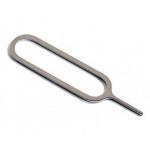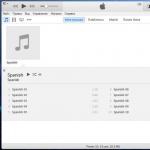How to check your vocabulary? How many English words do you know.
If you are now looking at the Oxford Dictionary and thinking, “I will never learn that many words!” - distract from sad thoughts and read this article. How many words do you really need to know? You may be pleasantly surprised!
In contact with
Classmates
Word, show your passport!
English students often ask, "How many words do I have to learn to be able to hold a conversation on any topic?" Good question, but before answering it, let me ask you another one: what do you think? A question to which there is no intelligible answer. Why? It is impossible to count the number of words in a language for one simple reason - it is difficult to decide what to consider as a word.
It is claimed, for example, that for the word "set" the Oxford Dictionary gives 464 interpretations. Should we consider a polysemantic word as one word or each interpretation as a separate word? And what about (phrasal verbs): “set up”, “set about”, “set apart”, etc.? And what about the so-called open compounds - words like "hot dog", "ice cream", "real estate"? Add to this the singular and plural forms, verb conjugations, different endings, prefixes and suffixes - and you will understand why it is so problematic to answer how many words there are in the English language.
In fact, the question should be put like this: “Do you know how many words are in the largest dictionary of the English language?” If you roughly imagine the number of words in a language, it can be compared with the number of words used 90-95% of the time in everyday speech and in the news.

Talk less, work more
In 1960, the famous American children's writer Theodor Seuss Geisel (better known under the pseudonym Dr. Seuss, author of The Grinch Who Stole Christmas, The Cat in the Hat, The Lorax, etc.) published the book Green Eggs and Ham. The book was written in just 50 words and was the result of a dispute between Seuss and his publisher, Bennett Cerf. The publisher believed that Seuss would not be able to create a finished work in such harsh conditions (before that, Seuss had already written "The Cat in the Hat", which featured 225 words).
If it's possible to write a book in just 50 words, does that mean we don't need 40,000 words to communicate with each other? Note, however, that according to Susie Dent, a lexicographer, the average active vocabulary of an adult English speaker is about 20,000 words, the passive one is about 40,000 words.
What is the difference between active and passive vocabulary? In simple terms, active vocabulary includes words that you can remember on your own and apply. As for the passive vocabulary, these are those words that you recognize, the meaning of which you know, but which you are not able to use yourself.
How many words do you know sir?
And here we come to the most interesting. On the one hand, an adult native English speaker has an active vocabulary of about 20,000 words. On the other hand, The Reading Teacher's Book of Lists states that the first 25 words are used in 33% of everyday written texts, the first 100 words in 50%, and the first thousand words occur in 89% of such texts!
Thus, we can safely say that only 3,000 words cover about 95% of texts on general topics (news articles, blog entries, etc.). Liu Na and Nation proved that 3000 is the approximate number of words we need to know in order to understand the rest from the context when reading unsimplified texts.

Count yourself!
The Oxford English Dictionary contains 171,476 common words. 95% of general texts cover a vocabulary of only 3,000 words. That's 1.75% of all words!
That's right: knowing 1.75% of the English vocabulary, you can understand 95% of what you read. This is only 7.5% of the average passive vocabulary of a native speaker (40,000 words). Isn't it great?
On Pareto's Law and the Importance of Linguistic Guessing
Mobile version for iPhone:
An alternative from the creators of Merriam-Webster's 3,000 Core Vocabulary Words:
How to assess your vocabulary
So, even though a native English speaker has an active vocabulary of 20,000 words and a passive one of 40,000, learning English will be successful if you learn only 3,000 words!
95% of general texts will become available to you, and you will understand the remaining 5% intuitively. Good luck with your study!
We read further:15366
In contact with
Estimating the number of learned and memorized words of a foreign language is primarily interesting for understanding how far a person has advanced in “passive” perception of information: texts, speech, films, etc. I propose to familiarize yourself with several methods that I used, found on the net and "home-made". Below - a couple of tests for assessing vocabulary, a technique for finding important words that have not yet caught on in the brain, some reasoning and some links.
Online tests
Of the many tests for evaluating the number of words, I liked two. A couple of years ago I came across a rather simple Test Your Vocabulary . As you go through three screens of words, you tick off the ones you (you think) know, and then get an estimate of the total number of words learned. Many of my friends complained about his inadequacy - they received an amount less than "the one about whom I know for sure that he knows worse." But when passing, there may be a mistake of a different kind - it seems that you know the word, but in fact you have already forgotten it. They say that the hand itself reaches out to put a tick next to a word that seems vaguely familiar, so you can subconsciously overestimate your overall rating.You know at least 10,500 English word families!
What do my results mean?
In general, there is no minimum vocabulary size. Language ability is related to vocabulary size, so the more words you know, the more you will be able to understand. However, if you want to set a learning goal, Paul Nation's (2006) research suggests that the following sizes might be useful:
How large a vocabulary is needed for reading and listening?
Skill Size estimate Notes
Reading 8,000 - 9,000
Word Families Nation (2006)
listening 6,000 - 7,000
Word Families Nation (2006)
native speaker 20,000
word families Goulden, Nation, & Read (1990)
Zechmeister, Chronis, Cull, D'Anna, & Healy (1995)
What is a word family?
There are many different forms of a word, so this test measures your knowledge of the most basic form of a word and assumes that you can recognize the other forms. For example, nation, a noun, can also be an adjective (national), a verb (nationalize), or an adverb (nationally). There are also forms which can be made with an affix such as de- or -ing which also modify the way that the word is used or adds to the basic meaning. For a test of receptive vocabulary knowledge such as this one, word families are considered to be the most accurate way of counting words.
Frequency Dictionaries
After registering at www.wordfrequency.info, you can download the American English Frequency Dictionary excel. There is also a text version.Like this:
Rank Word Part of speech Frequency Dispersion
1 the - a 22038615 0.98
2 be - v 12545825 0.97
3 and - c 10741073 0.99
4 of - i 10343885 0.97
5 a - a 10144200 0.98
6 in - i 6996437 0.98
7to-t 6332195 0.98
8 have-v 4303955 0.97
…
…
4996 immigrant - j 0.97
4997 kid - v 5094 0.92
4998 middle-class-j 5025 0.93
4999 apology - n 4972 0.94
5000 till - i 5079 0.92
The file contains 5000 English words, sorted by frequency of occurrence. The frequency was calculated on a huge heterogeneous array of English texts. I recently saw a friend of mine look up words he didn't know by checking his vocabulary. Looking through the first 500, I did not find any unknowns. He showed an extract on his smartphone - about a dozen words from the second thousand (that is, from 1000 to 2000) and about 20 from the third. It's funny that when you go through the list, you come across sequences of words that successfully add up to phrases or even short sentences. The logic is very simple - if the word is very common according to statistics, and you don't know it, then it's better to learn it and see examples of use.
After reading the list of words unknown to him (already with translation), I saw the following thing. I knew about 50-60% of these words unknown to him, but some of the meanings of the translations recorded there were unknown to me, there were several words completely unknown to me.
In general, the site tries to be commercial, they sell lists over 5000 long, but this is not so interesting anymore.
So far, this friend of mine is writing a program with a convenient interface to look up unknown words - for learning purposes. I suggested to him that for a global assessment, not this list, but thinned one: every seventh word from the total list of 60,000 words is given. In fact, even watching the first couple of thousand is disheartening, not everyone will get to 5000. Although I can’t say for all 100, but the thinned dictionary will certainly show at least one word from the “family”, and the time will be spent, respectively, 7 or 10 times less (depending on the frequency of thinning).
By the way, such frequency dictionaries of the Russian language contain about 160 thousand words, including abbreviations and abbreviations. There are several different similar "corpuses" of English words from different organizations.
I'm interested in another question: how accurate are the tests that give an estimate of the number of words you know? It is possible that this could be determined just by checking the frequency dictionary, as well as comparing the list of selected unknown words - their number and entry into different "families".
There are general laws of remembering and forgetting. One of the main things: if a person has learned something and does not repeat, does not use it, the information is forgotten exponentially from time to time. On the other hand, a few repetitions lengthen, stretch the falling exponent to an acceptable level. I was very surprised when a friend who worked as a tutor for schoolchildren told me that there is a sequence of time intervals for deep memorization: say, after 20 minutes, then after 8 hours, another day, etc., after which the information is planted firmly in the brain . That is, the statistically maximum level of the excitation signal is provided in the brain when it encounters this information.
Ebbinghaus curve, from Wikipedia.
How I learned words at the institute.
Without taking into account the standard course, where the requirements for the first three years were quite tough, I tried to read fiction. The first big book was the old Soviet edition of Conan Doyle's The Lost World. I don’t know how it was adapted, but there were plenty of Victorian words and expressions in the text, and this greatly delayed the progress towards the end ... Of course, it was possible to look into Lingvo from a computer, but I didn’t like to read at the computer, but to run back and forth for each new word quickly tired. Tablets were not common then, a pocket electronic translator is an expensive rarity, so I developed a paper system for myself. In a thick 96-sheet notebook, the spread was divided into 6 columns. Now I tried to find a notebook - I got lost. Will have to describe in words. Divided the alphabet into groups of letters, for example - a..d, e..f, g..j, k..n, o..q, r..t, u..w, x..z. Approximately, by eye, I estimated the statistical percentage of words that begin with these letters and divided the columns in the spread into rectangles. For example, the group a..d gave 2/3 of the first column, and so on. The group x..z was assigned the last remaining smallest piece in the 6th column. Then everything is simple. I met an unknown word - enter with the translation in the desired rectangle. Nothing inside the block is not in alphabetical order - it will not take long to find. To get the translation while lying on the bed, you need to get into the book dictionary. That is, the value of receiving a translation is quite large, more than now look at Lingua or an online translator likeHi all! Each language contains a certain number of lexemes. The complete vocabulary of English has about 300,000 words. Of course, such a figure will discourage a beginner from wanting to learn a foreign language. However, I hasten to reassure you that you will not need to learn all these lexemes, since even educated native speakers have an arsenal of about 100,000 words. Today we will find out how many English words you need to know in order to speak English fluently. Minimum Vocabulary There are methods of learning English, in which students are forced to learn up to 200 words daily. For some, this approach is applicable, but for the majority, these numbers remain incomprehensible, and the learned words do not bring them closer to free communication with native speakers. In my opinion, the best organization of classes is, on the contrary, the economy of words, that is, memorizing less, but more efficiently.
Do not chase quantity, quality should be your prerogative. It is much better if you know 1000 words by heart than to know 3000-4000 lexemes badly. Each teacher determines his own minimum required number of lexemes. But only you can decide how many words you need to know so that they are necessary and sufficient to achieve your goals.
As experience shows, a minimum vocabulary of 450 correctly chosen lexemes can compensate for about 90% of the vocabulary required for free everyday communication in English. For comfortable English reading, you need a little more words, but passively. With knowledge of approximately 1600 lexemes, you will be able to navigate freely in artistic and journalistic texts.
The famous teacher, polyglot and methodologist E. Gunnemark made calculations of the necessary vocabulary for the English language, dividing them into several categories.
So, he calculated that for oral speech it would be enough to learn from 40 to 1000 correctly selected, most frequent words:
- 40 lexemes will cover about 50% of everyday use in communication
- 200 words will already raise this figure to 80%
- 300 lexical units will add a few more percent - 85%
- 450 words is almost 90%
- 900-1000 - almost 98% of what you can say or hear in everyday conversation
I note that these indicators are not exact calculations, but a general idea of how many units you need to remember in order to feel confident when communicating with native English speakers. E. Gunnemark A well-known polyglot found out that for reading, you will need to pick up and learn about 80 - 8000 high-frequency words in order to understand an ordinary simple text:
- 80 words will help to understand about 50% of the text
- 200 units - 60%
- 400 tokens - cover about 70%
- 2000 words - approximately 90%
- 8000 lexical units will help you understand written or printed text at 100%
Again, these are just indicative numbers. In some cases, you will be able to understand the text, knowing only 45 words, and in others, you will not have enough knowledge even 1,000.
Why know 100,000 words?
You ask, why do we need 100,000 words, if only a few thousand are enough for communication? On the one hand, you are right - this number of lexemes is quite enough for everyday conversations. BUT - this is the minimum vocabulary. If you want to become a full-fledged, educated member of society who will be able to carry on a conversation on any topic that a native English speaker will offer, then you need to constantly increase your vocabulary.  Rich vocabulary What gives a rich vocabulary:
Rich vocabulary What gives a rich vocabulary:
- 350-700 words - enough for language proficiency at a threshold level
- 800-1200 lexemes - an active arsenal for communication or a passive reserve for reading at a beginner level
- 1500-2500 units - confident reading or fluent communication on everyday topics
- 3000-7000 words - free reading of specialized literature and the press
- 8000-9000 lexemes - full-fledged oral and written communication, reading any kind of literature
- 10,000-40,000 words - active vocabulary of the speaker
- 50,000-100,000 units - a passive arsenal of words for an educated native speaker of English
Thus, for you as a foreigner, knowing 9,000 English words will be enough to confidently study, work and live among English speakers.
I also note that the knowledge of this vocabulary in itself does not guarantee you free communication. To be able to speak a foreign language requires practice and constant training, knowledge of basic knowledge of English grammar and syntax.
With regard to international vocabulary and special terms, here you should not have any particular difficulties. Since it is enough to check these words once with the term in the native language and remember.
Core vocabulary levels
In pedagogical practice, teachers and linguists distinguish several levels of the basic vocabulary, which serve as a guide for the beginner. They significantly reduced the huge gradation by creating a list of three main levels:
- Level A— basic vocabulary and phrase stock — 350 — 500 lexemes. This amount is quite enough to cover about 85-90% of all uses in daily oral conversation or about 70% of plain text in writing.
- Level B- mini-level or minimum vocabulary - phrasal stock - 900 -1000 units. This number is enough to make up for approximately 95% of uses in everyday spoken conversation and approximately 85% of simple printed text.
- Level C- media level or average vocabulary - 1200-2000 words. This amount is enough to compensate for almost 100% of the use of phrases in everyday oral communication or about 90% of a literary text.
According to this gradation, 2,000 words are enough for a beginner for everyday communication in English. Again, I note that everything is relative, and only you determine for yourself how many English words you need to know. But it’s also not worth overloading yourself with a lot of unnecessary information.
What should be (English) vocabulary) to solve certain problems (reading English literature, communicating on everyday topics, conducting business correspondence, watching television, etc.)? Many English learners ask themselves this question.
Today we will talk specifically about English vocabulary for different levels and you will find out what opportunities each of these levels opens up for you. First, let's find out what a vocabulary is. Vocabulary is a set of words that a person owns. It is divided into active (words that a person uses himself in writing and speaking) and passive (words that a person recognizes when reading or speaking, but does not use them himself). It is obvious that the passive margin significantly exceeds the active one. It is worth noting that vocabulary should be understood not only as knowledge of words, but also their correct pronunciation, spelling and speech recognition.
How many words are in English?
It is rather difficult to answer this question. The history of Great Britain is confusing in this regard - the Iberians (the most ancient population of the British Isles), the Celts (came from modern Belgium and France), the Picts (lat. piches- painted), the 400-year domination of the Romans, the invasion of the West Germanic tribes (Angles, Saxons, Nomes, Frisians), the raids of the Scandinavians and, finally, the Normans (Northern France, King William the Conqueror), led to the fact that the words in the English language became very lot. The famous Oxford English Dictionary, which contains only English words and expressions, has about 600,000 English words. But according to the linguistic portal Global Language Monitor, which also includes hybrid words from dialects (Chinese English, Spanish English, computer jargon and others), there are already more than a million words in English. In practice, the vocabulary of a person for whom the language is native is an order of magnitude smaller than all the words in the language. For example, an educated native English speaker averages between 12,000 and 18,000 words. For comparison, I’ll say that V. I. Dal’s “Explanatory Dictionary of the Living Great Russian Language” has about 200,000 words, 30,000 of which are the most used, and a person with a higher education knows about 10,000 Russian words. (Wikipedia).
English vocabulary for different levels
And how can one or another English vocabulary be used?
- In order to be able to speak fluently or read at a basic level (Elementary / Pre-Intermediate), you need to have about 1000 words in stock.
- If you have about 2500 words in your asset, you can already communicate quite tolerably on everyday topics, read at an average level.
- With 4000-5000 words, you can freely communicate on various topics, read newspapers and special literature, watch and listen to TV / radio programs (understanding the basic meaning).
- With a vocabulary of 8,000 words or more, you can already communicate at the level of an average native speaker. This reserve is enough to feel confident among the carriers in almost any situation. You can read any English literature, watch movies, have conversations on a variety of topics.
Now you understand what English vocabulary You need to achieve your goals in your life. Having reached a certain level of English proficiency, you need to constantly maintain it. It should be remembered that if you do not use the language actively, do not practice English in everyday life, you can easily lose your skills acquired by such painstaking work. Your active English vocabulary will shift towards passive. How to make sure that this does not happen? The ideal solution would be to stay in an English-speaking country. In this case, you will have constant practice and your level of language proficiency will naturally improve and increase. But what if this is not possible? In my article, I described in detail the various approaches to learning English and effective ways to maintain motivation. To test your English vocabulary, you can use the good Test your vocab service.
You can also check out other articles on vocabulary learning.
Although the textbooks are aimed at expanding the vocabulary, it must be said that this is only auxiliary material necessary for learning really useful words and phrases, phraseological units used in everyday life by native speakers. After passing the lesson according to the textbook, the most important thing begins - the introduction of new lexical units into your spoken and written speech.

To do this, we offer several options:
- keeping a diary in English;
- viewing and analysis of videos, films and series;
- reading adapted and original literature;
- oral communication in English, correspondence with native speakers.
- Using the best English textbooks for learning vocabulary, you will be able to progress in learning much more effectively. After all, it is not in vain that they say that it is a poor vocabulary that slows down a person and does not give him the opportunity to advance in learning English.
- Learning materials designed to increase vocabulary will help you work productively with lexical material, which will allow you to improve your listening comprehension. Of course, sometimes we isolate individual words from a fast flow of speech, but basically the problem lies in a very limited vocabulary.
- Of course, by constantly working on increasing your vocabulary, it will become much easier for you to express your thoughts in English in the process of communication.
Well, now, let's start reviewing the best textbooks in our opinion, which will gradually help develop your vocabulary. Let's start with the best series of tutorials for those who aspire to speak like a native speaker - English collocation in use. 
Download the text of the book English Collocations in Use Intermediate in .pdf format via a direct link (downloads: 7226) .
Download the text of the book English Collocations in Use Advanced in .pdf format using a direct link (downloads: 3219) .
We have repeatedly emphasized that words must be taught in context, and this textbook is just what you need. Each textbook (depending on the level) contains the most common, so to speak, well-established phrases.
The textbooks are divided into levels and each contains 60 lessons. These materials are ideal for self-study to develop vocabulary. At the end of each textbook there are keys (answers) to exercises and various tasks.

Download the text of the book English Vocabulary in Use Elementary in .pdf format via a direct link (downloads: 4510) .
Download the text of the book English Vocabulary in Use Pre-Intermediate and Intermediate in .pdf format via a direct link (downloads: 4269) .
Download the text of the book English Vocabulary in Use Upper-Intermediate in .pdf format via a direct link (downloads: 3588) .
Download the text of the book English Vocabulary in Use Advanced in .pdf format using a direct link (downloads: 2801) .
These materials are suitable for both beginners and those who have been studying English for a long time, but all to no avail.
A series of textbooks Test Your Vocabulary.
Five books from this + Start series are units (lessons) that help you test your knowledge of vocabulary by completing various tasks, solving crossword puzzles, and so on. During the tests, you will have the opportunity to significantly replenish your vocabulary.

Download the text of the book Test Your Vocabulary Start in .pdf format via a direct link (downloads: 2527) .
Download the text of the book Test Your Vocabulary 1 in .pdf format via a direct link (downloads: 1854) .
Download the text of the book Test Your Vocabulary 2 in .pdf format via a direct link (downloads: 1436) .
Download the text of the book Test Your Vocabulary 3 in .pdf format using a direct link (downloads: 1460) .
Download the text of the book Test Your Vocabulary 4 in .pdf format using a direct link (downloads: 1525) .
Download the text of the book Test Your Vocabulary 5 in .pdf format via a direct link (downloads: 1458) .
Key Words for Fluency- An interesting series of benefits that will help expand your passive vocabulary. Each textbook contains 22 thematic lessons. For each word, the authors of the textbook selected about 10 words, in conjunction with which they are regularly used in real life. Memorizing basic phrases will help you learn how to use English prepositions at the right time and in the right place.

Download the text of the book Key Words for Fluency Pre-Intermediate in .pdf format via a direct link (downloads: 3295) .
Download the text of the book Key Words for Fluency Intermediate in .pdf format via a direct link (downloads: 2260) .
Download the text of the book Key Words for Fluency Upper-Intermediate in .pdf format via a direct link (downloads: 2173) .
4000 Essential English Words- a series of textbooks that is ideal for students with an elementary level of knowledge. With each book, the words will become more difficult. But the most important thing is that there are no archaisms or rarely used words. 4000 is not an unfounded statement. Each textbook has 30 lessons, and in each of them, the compilers of the textbook offer English learners 20 new words. By completing all the tutorials in this series, you will have learned 3,600,000 words, plus another 400 words from the appendices given at the end of the tutorial.

Download the text of the book 4000 Essential English Words 1 in .pdf format via a direct link (downloads: 3987) .
Download the text of the book 4000 Essential English Words 2 in .pdf format via a direct link (downloads: 1905) .
Download the text of the book 4000 Essential English Words 3 in .pdf format using a direct link (downloads: 1800) .
Download the text of the book 4000 Essential English Words 4 in .pdf format via a direct link (downloads: 1757) .
Download the text of the book 4000 Essential English Words 5 in .pdf format via a direct link (downloads: 1763) .
Download the text of the book 4000 Essential English Words 6 in .pdf format via a direct link (downloads: 1807) .
Among the textbooks that deserve your attention, it is necessary to include a series of textbooks - English Vocabulary Organizer. These benefits can also be used on your own. Although there are exercises that involve oral dialogues with the teacher, this block of tasks can be completed independently. The manual is accompanied by a disk, which also contains various kinds of exercises. The textbook itself contains texts with new words and exercises for better memorization.
Download the text of the book English Vocabulary Organizer with key in .pdf format via a direct link (downloads: 2491) .
For all beginners who want to master English idiomatic expressions and phrasal verbs, we advise you to take a closer look at the textbooks of the series Can you believe it. Here you will find real stories with full explanations and exercises to reinforce the material.

Download the text of the book Can You Believe It? 1: Stories and Idioms from Real Life: 1 Book in pdf format via direct link (downloads: 2933) .

Download the text of the book Can You Believe It? 2: Stories and Idioms from Real Life: 2 Book in pdf format via direct link (downloads: 1801) .

Download the text of the book Can You Believe It? 3: Stories and Idioms from Real Life: 3 Book in pdf format via direct link (downloads: 1689) .
Since beginners to learn English may encounter elementary misunderstanding while reading authentic textbooks, we decided to give them a few examples of vocabulary expansion textbooks written in Russian.
1.Karavanova - 250 phrasal verbs.
The tutorial contains 250 of the most common English verbs. The textbook gives 5-7 basic verbs and phrasal verbs with them. Then you need to perform a lot of exercises to consolidate the knowledge gained.

Download the text of the book 250 most common English phrasal verbs. Karavanova N.B. in .pdf format via direct link (downloads: 2023) .
2.Ilchenko. Phrasal verbs in English.
This manual can be called a completely complete textbook for both beginners and continuing students who are faced with the need to learn phrasal verbs. Most importantly, new phrasal verbs are given in context, which will help you use them correctly in everyday communication or writing an essay. Yes, it's hard not to remember them. All information in the manual is divided into thematic blocks and contains the most necessary phrasal verbs for real life.

Download the text of the book Phrasal verbs in English. Ilchenko V.V. in .pdf format via direct link (downloads: 1848) .
3.Christmas "Phrasal verbs in colloquial English.
A good guide for students of such a broad topic as phrasal verbs. But without knowledge of grammar in this textbook, it makes no sense to study.

Download the text of the book Phrasal Verbs in Spoken English. Christorozhestvenskaya L.P. in .pdf format via direct link (downloads: 1466) .
4.Another series of textbooks in Russian by Litvinov "Steps to Success".

Download the text of the book My First 1000 English Words: A Memory Technique in .pdf format via a direct link
Views: 66 162 Title: The best English textbooks for vocabulary replenishment




